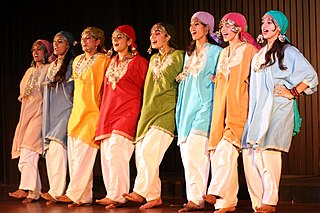Related Research Articles
Kak is a Kashmiri Pandit surname originating in the Kashmir Valley of Jammu and Kashmir, India.

Munshi is a Persian word, originally used for a contractor, writer, or secretary, and later used in Mughal India for native language teachers, teachers of various subjects, especially administrative principles, religious texts, science, and philosophy and were also secretaries and translators employed by Europeans.

Kashmiris are an Indo-Aryan ethnolinguistic group speaking the Kashmiri language and originating from the Kashmir Valley, which is today located in Indian-administered Jammu and Kashmir.
Bakshi may refer to:
Sapru, also spelled as Sipru or Saproo is a Kashmiri Pandit clan and surname native to the Kashmir Valley of Jammu and Kashmir, India.
Jalali is a Kashmiri surname. Notable people with the surname include:
Madan/Madaan/Madhan is a Hindu surname. In India, it is found among Parsis, Kashmiri Pandits, Punjabi Aroras and Sindhi Lohanas. It is also found among Europeans.
Zutshi is a Kashmiri Pandit clan and surname, originating from the Kashmir Valley of Jammu and Kashmir, India.
Bhan is a Kashmiri Pandit clan and surname native to the Kashmir Valley of Jammu and Kashmir, India. The Bhan Brahmin dynasty founded an erstwhile tribal hill state of Kashmir in the 10th century AD. It was ruled by the Bhan dynasty for two hundred years. Currently, all the territory of this state of Bhan is found in the Sidhnuti district of Pakistan Occupied Kashmir. Bhan, as a surname, is also used by Punjabi Saraswat Brahmins.
Razdan is a Kashmiri Pandit surname and clan that refers to the royal or aristocratic bloodline of old Kashmir, mostly attributed to the warriors of the Kashmir Valley of Jammu and Kashmir, India. They are Saraswat Brahmins from the Kashmir Valley, belonging to the larger community of Pancha-Gauda Brahmins, and are widely known for their allegiance to Lord Shiva.
Pandit, also spelled as Pandita or Pandith is a Kashmiri Pandit clan or surname, native to the Kashmir Valley in Jammu and Kashmir, India. Pandit as a last name depicts a Brahmin lineage and is used by both Hindus and Muslims in Kashmir.
Gurtu or Gurtoo is a Kashmiri Pandit clan or surname, native to the Kashmir Valley in Jammu and Kashmir, India.
Wali is a Kashmiri surname. Notable people with the name include:
Bazaz is a Kashmiri Pandit clan and surname native to the Kashmir Valley of the Indian union territory of Jammu and Kashmir.
Tikoo, also spelt as Tickoo, Tikku, Tikhu or Ticku is a Kashmiri Pandit clan and surname native to the Kashmir Valley of the Indian union territory of Jammu and Kashmir.
Thussu, also spelt as Thusu, Thusoo or Thussoo is a Kashmiri Pandit clan and surname native to the Kashmir Valley of the Indian union territory of Jammu and Kashmir. Thussu as a last-name is used by both Kashmiri Hindus and Kashmiri Muslims of Hindu lineage.
Fotedar or Fotadar is a Kashmiri Pandit clan, kram and surname native to the Kashmir Valley of Jammu and Kashmir, India.
Raina is a Kashmiri Pandit clan and surname, native to the Kashmir Valley of Jammu and Kashmir, India. Raina as a last-name depicts a Brahmin-lineage and is today found amongst both Kashmiri Hindus and Kashmiri Muslims.
Qazi is a Kashmiri Pandit clan or surname, native to the Kashmir Valley in Jammu and Kashmir, India.
References
- ↑ Pandit, Bansi (2008). Explore Kashmiri Pandits. Dharma Publications. p. 99. ISBN 9780963479860 . Retrieved June 5, 2024.
- ↑ Agrawal, Premendra (August 20, 2014). Accursed & Jihadi Neighbour. Commercial Services. p. 86. ISBN 9788193051207 . Retrieved June 5, 2024.
Meaning of surnames found on the Kashmiri Pandit tree: Bakaya, Sapru, Bakshi, Munshi, Wazir, Chalkbast, Bhan, Langar or Langroo, Wattal, Bazaz, Taimini, Mattu, Chak, Zalpuri, Khar, Hazari, Zutshi, Razdan, Tikhu, Kathju, sopori, Thussoo, Haksar, Raina, Waloo or Wali, Wantu/Wanchu, Gamkhwar, Kakh, Mushran, Sharga, Handoo, Gurtu, Kitchlu, and Ganjoo.
- ↑ Wani, Muhammad Ashraf; Wani, Aman Ashraf (2023). The Making of Early Kashmir- Intercultural Networks and Identity Formation. Taylor & Francis. p. 72. ISBN 9781000836554 . Retrieved June 5, 2024.
The ethnicity was also constructed on the basis of tribal background, occupations or some contingencies. For instance, the brahamanas were divided into 103 gotras (tribal divisions), and each gotra was divided into distinctive families famous after family appellation called kram. Kram is often the relic of a nickname applied to the ancestor of the subdivision. And when during the rule of Muslims, some of them held different positions in the state apparatus. They came to be called after those offices such as Razdan, Fotadar, Ambardar, Ganju, Karawani, Diwani, Qazi, Muhatasib, Naqib, Amin and Waguzari, which became their permanent surnames.